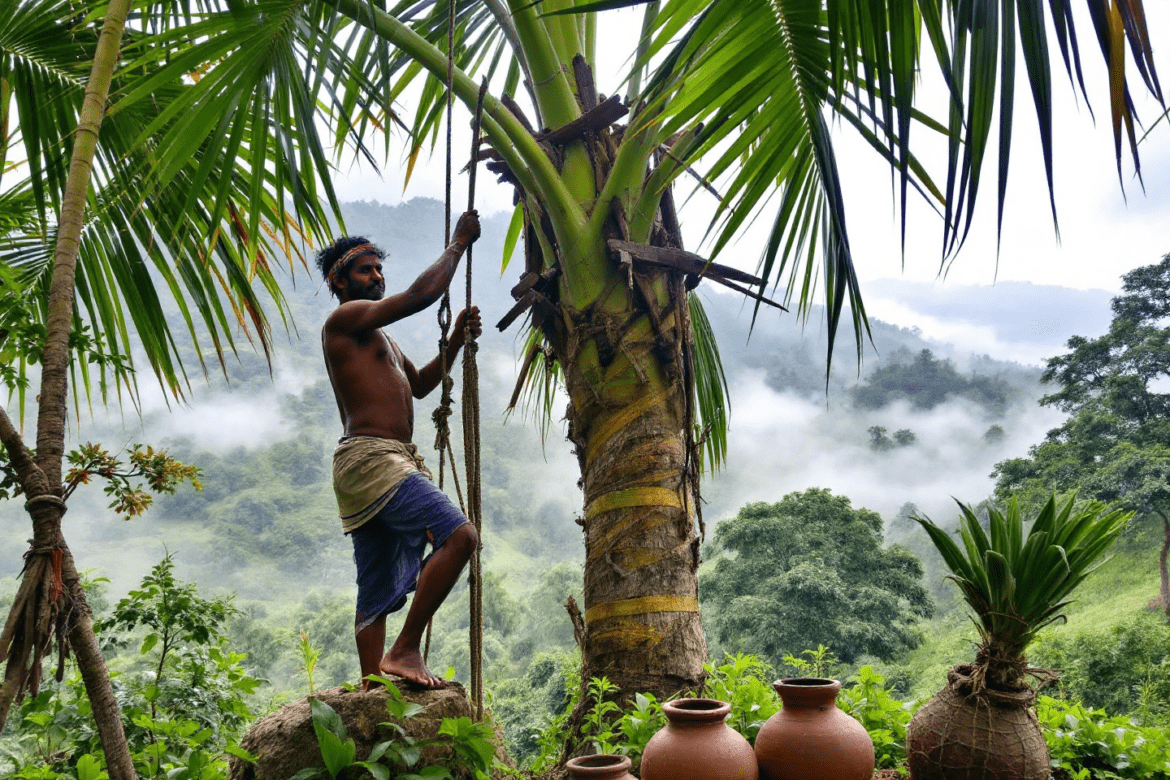The lush and rain-fed Malnad region of Karnataka, nestled in the foothills of the Western Ghats, is renowned for its rich biodiversity, traditional agriculture, and cultural heritage. One lesser-known yet vital part of this heritage is the art of Neera tapping—a skill passed down through generations, deeply woven into the social and economic fabric of the region.
This article explores the traditional practices of Neera collection in Malnad, highlighting the sustainable methods, cultural rituals, and the evolving role of this practice in rural livelihoods.
The Malnad Connection with Palm Trees
In Malnad, wild and cultivated coconut palms are abundant. Tapping neera from these palm trees has government restrictions because of it’s probability of being used as alcohol. Hence the government of Karnataka under a special provision has approved neera tapping from Coconut tree. The tappers are trained to process the inflorescence by tapping to collect Neera, a skill passed on to them from generations. In Tamilnadu this practice known locally as “padaneer matodu”. These palms thrive in the humid climate, making them ideal for continuous tapping.
Neera tapping is often done seasonally, especially during cooler months when fermentation risk is lower.
Traditional Tapping Process
1. Tree Selection and Preparation
Experienced tappers select healthy, mature coconut or palmyra palms, usually 8-10 years old. Only trees with good canopy and flowering potential are chosen.
2. Climbing the Tree
Using coir ropes and wooden foot supports, the tapper climbs the tree early in the morning, a practice requiring immense balance and strength.
3. Inflorescence Tapping
A small cut is made at the unopened flower bud, and a mud or earthen pot is tied to collect the sap. The pot is often coated with lime or smoke-treated to prevent fermentation.
4. Hygiene and Rituals
In traditional households, utmost importance is given to cleanliness, both physical and spiritual. The tapping tools are sometimes blessed or consecrated during village festivals or harvest ceremonies.
Role of Tappers in Malnad Society
Tapping is often a hereditary occupation practiced by specific communities. These skilled individuals are known locally as “Gowdas” or “Togaru”, depending on the sub-region.
The tapper earns from selling fresh Neera, or its processed products like jaggery, vinegar, or sugar syrup.
Families often boil Neera at home to make traditional sweets or preserve it in earthen jars.
Neera in Daily and Ritual Life
In Malnad culture:
Neera is offered to guests as a sign of hospitality.
It is consumed during fasts as an energizing drink.
During certain festivals like Ugadi and Makara Sankranti, Neera is part of ceremonial offerings where it is offered to the god and later distributed among people as prasad.
Challenges Faced by Traditional Tappers
Despite the rich cultural history, traditional Neera tapping is in decline due to:
Lack of young practitioners
Deforestation and reduction in palm trees
Market limitations and lack of organized collection systems
Fermentation risks without cold chains
Government Intervention & Support
- Legal Approval During neera movement in the year 2012 the government recognised the benefits of neera and approved licensing method to tap neera.
- Framework A proper framework is set to bring transparency, efficiency and market access to the neera tappers.
- Policy Well acknowledged neera promotion policy is in motion through agri-research institutes to develop innovative tapping, transportation and dispensing techniques.
Preserving the Tradition Through Innovation
To keep this art alive:
Training younger generations in tapping techniques is crucial.
- Change2 is one such movement where value addition to neera is a continuous process.
- Raw Cafe is the experience centre to witness the value added cuisines from neera.
Community-level Neera cooperatives is in motion to ensure better prices and safety.
Government and NGOs are coming together to provide technical support and modern tapping kits.
Traditional Neera festivals and agro-tourism initiatives can revive interest.
The traditional Neera tapping practices in Malnad are more than just a livelihood—they are a living tradition that reflects harmony between man and nature. Preserving these practices not only supports rural economies but also celebrates a sustainable lifestyle rooted in cultural wisdom. By integrating modern science with age-old knowledge, Malnad’s Neera heritage can be preserved and even expanded globally.

1 comment
[…] of the coconut is a traditional organic beverage known for its rich nutrients. Traditionally neera is extracted at dawn in remote pockets of Chikamagalur by the skilled tappers who used to collect this sap juice […]